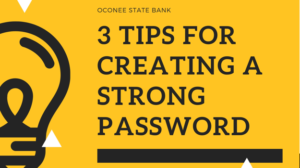
3 Tips for Creating a Strong Password
Amber Beatty (member of UGA’s AMA)
A strong password helps you keep your personal info safe, protect your emails, files, and other content, and prevent someone else from getting in to your account. Most online accounts including Oconee State Bank’s virtual banking portal, require users to create a password with 8 characters or more using any combination of letters, numbers, and symbols.
My advice is to avoid using a weak password that:
- Is easily guessable. Example: The word “Password” is the most commonly used password. It’s also pathetically weak – as are ’default’ and ’blank’. These are simple words that can be easily guessed by a user. However, humans aren’t your only concern. Programs that use automated databases can perform a dictionary assault on your system, identifying the password easily.
- You are using on several other accounts. This could become a problem because if one account is to be hacked it will be easy for the others to be hacked as well.
A strong password should be:
- Memorable to you: Considering that most computer keyboards contain 101 to 105 keys, you have a ton of options when it comes to crafting a unique password. You don’t have to think of it just as the numbers you see, but rather, as a canvas to draw on.
- Unique and long: The longer the better. Longer passwords are harder for thieves to crack.
- Avoids personal info or common phrases: Sometimes humans do try to crack passwords, so don’t help them out by using your son’s birthday or the phrase printed on your favorite coffee mug.
To keep your password secure it is important not to write it down anywhere obvious or highly visible to others. If you have trouble remembering multiple passwords a good idea would be to try using google chrome’s password memory tool that keeps all of your passwords backed up for you. Another tip is to back up your accounts with identity questions or updating your recovery phone number and email address.



